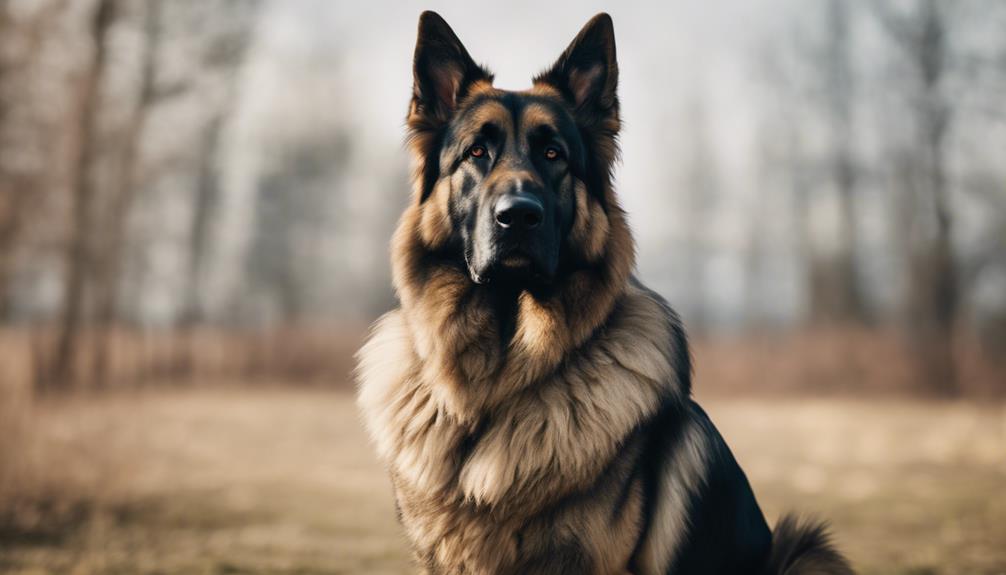🐾 Paw-some Partnership Alert! 🐾
As a pack of German Shepherd enthusiasts at MixGermanShepherd.com, we're always sniffing out the best products for our furry friends. Guess what? When you fetch something from Amazon through our links, we earn a little treat! 🦴
Imagine having a loyal companion who stands as tall as a majestic oak tree, exuding both strength and grace in every step. The King Shepherd breed embodies a unique blend of characteristics that set them apart in the realm of canine companions. From their striking appearance to their versatile skill set, King Shepherds offer a fascinating mix of traits that intrigue both experienced dog owners and newcomers alike. As you explore the intricacies of what makes these regal canines so special, you'll uncover a world of intriguing facts and insights waiting to be discovered.
Key Takeaways
- King Shepherds blend German Shepherd intelligence, Alaskan Malamute strength, and Great Pyrenees demeanor
- Unique coat color variations like sable and brindle set them apart
- Exceptional loyalty and deep emotional connections with their families
- Intelligent, trainable, and physically robust, making them versatile and devoted companions
King Shepherd Breed Origins
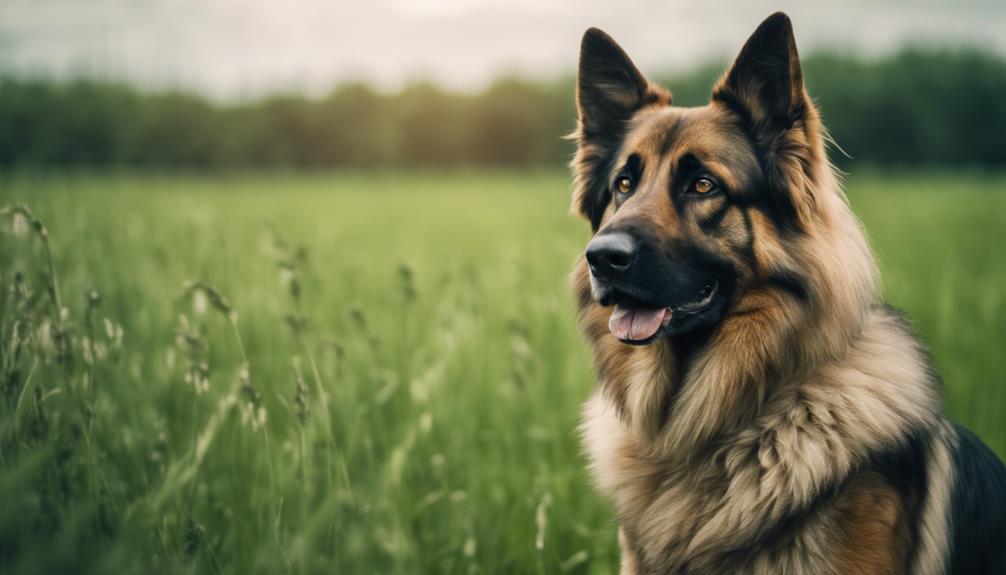
The King Shepherd breed originated in the United States during the early 1990s through a deliberate breeding program that involved crossing German Shepherds with larger breeds like Alaskan Malamutes and Great Pyrenees. This intentional breeding aimed to create a large breed that retained the intelligence and loyalty of German Shepherds but with a larger size suitable for various roles. The inclusion of Alaskan Malamutes and Great Pyrenees in the breeding program contributed to the King Shepherd's majestic appearance and robust build.
German Shepherds, known for their intelligence and versatility, were a foundational breed in the development of the King Shepherd. By crossing them with Alaskan Malamutes, which are known for their strength and endurance, and Great Pyrenees, which are renowned for their protective instincts and gentle demeanor, breeders were able to create a well-rounded and capable large breed dog.
The United States served as the breeding ground for this unique breed, where breeders carefully selected traits from each contributing breed to create the distinctive characteristics of the King Shepherd. This deliberate process resulted in a breed that not only excels in roles such as livestock guarding, personal protection, and therapy work but also exhibits a friendly yet reserved demeanor towards strangers, making them excellent companions when properly socialized.
Majestic Size and Appearance
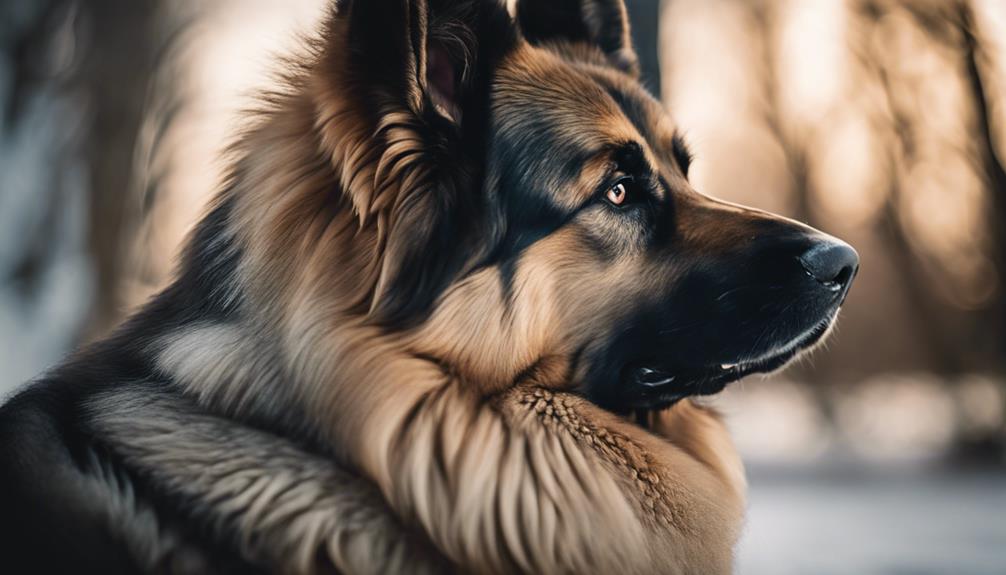
With a majestic size and imposing appearance, King Shepherds stand out for their robust build and striking physical features. These dogs are known for their impressive size, with males typically standing between 27-31 inches tall and weighing 90-150 pounds, while females range from 25-27 inches and 75-110 pounds. This substantial build, characterized by a deep chest and muscular frame, contributes to their powerful presence.
One of the key elements that give King Shepherds their distinctive look is their square skulls, which add to their regal appearance. Balanced muzzles and almond-shaped dark brown eyes further enhance their majestic aura. Their coat, which can come in various colors such as black, white, tan, brown, gray, or silver, complements their overall striking appearance.
When encountering a King Shepherd, their size and robust build immediately make an impression. These dogs exude strength and confidence, traits that are further accentuated by their physical features. The combination of their stature, square skulls, and almond-shaped eyes creates a visually captivating breed that commands attention and admiration.
Intelligent and Loyal Nature
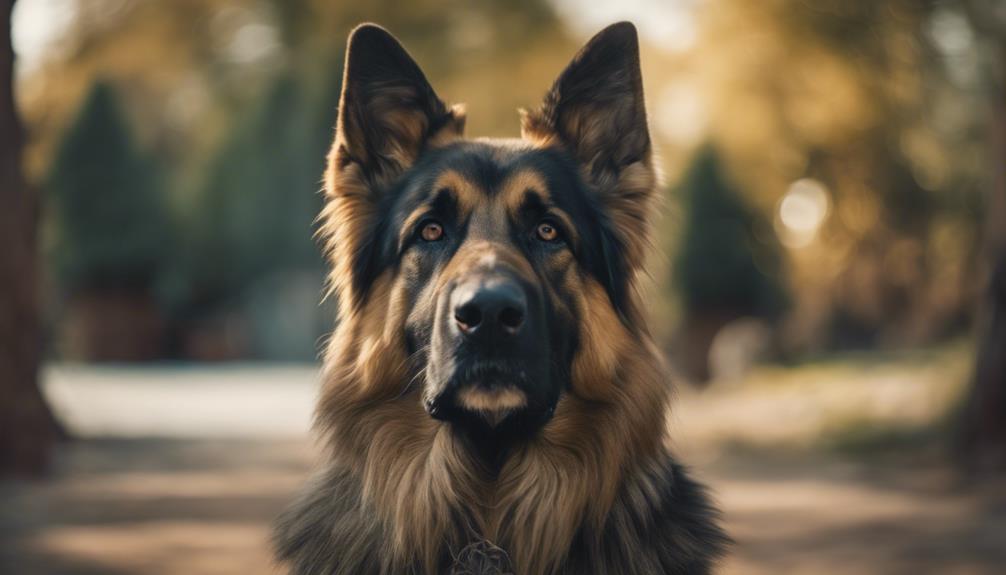
King Shepherds demonstrate their loyalty through unwavering devotion to their families, forming deep emotional connections. Their high intelligence enables them to solve problems efficiently and adapt to various tasks with ease. This breed's strong bond with their owners fosters trust and companionship, making them exceptional companions in a variety of roles.
King Shepherd's Loyalty
Demonstrating an unwavering dedication to their owners, King Shepherds exhibit exceptional loyalty through their intelligent and protective nature. This breed's loyalty is deeply ingrained in their behavioral traits, making them reliable companions and guardians. King Shepherds' protective instincts, coupled with their intelligence, allow them to excel as watchdogs, alerting their human family members to potential dangers. Their ability to form strong bonds with their owners enhances their loyalty, fostering a sense of trust and companionship. This loyalty extends beyond mere obedience; it is a heartfelt connection that drives them to prioritize the well-being and safety of those they consider part of their family. King Shepherds' loyalty is a defining characteristic that sets them apart as devoted and dependable companions.
Intelligent Problem-Solving Skills
Possessing exceptional problem-solving skills, King Shepherds showcase a remarkable blend of intelligence and loyalty in their behavior. This unique combination enables them to excel in various roles, from therapy work to search and rescue missions and personal protection. Here are some key points to consider:
- King Shepherds are intelligent problem solvers, making them quick learners.
- Their loyalty enhances their ability to bond closely with their owners.
- This breed's cognitive function allows them to understand complex commands.
- They excel in tasks requiring critical thinking and decision-making skills.
- The intelligence and loyalty of King Shepherds make them ideal for roles such as therapy work, search and rescue, and personal protection.
Strong Bond With Owners
With their intelligent and loyal nature, King Shepherds develop a deep and unwavering bond with their owners, characterized by a keen understanding of their needs and a protective instinct. Their loyalty transcends mere companionship, as they become devoted family members who prioritize the well-being of those they bond with. The intelligence of King Shepherds enhances this bond, allowing them to anticipate and respond to their owners' commands effectively. This unique blend of loyalty and intelligence also makes King Shepherds exceptional watchdogs, as they are naturally protective of their human companions. The strong bond formed between King Shepherds and their owners goes beyond mere pet ownership, creating a meaningful and enduring relationship based on trust and mutual understanding.
Unique Coat Color Variations
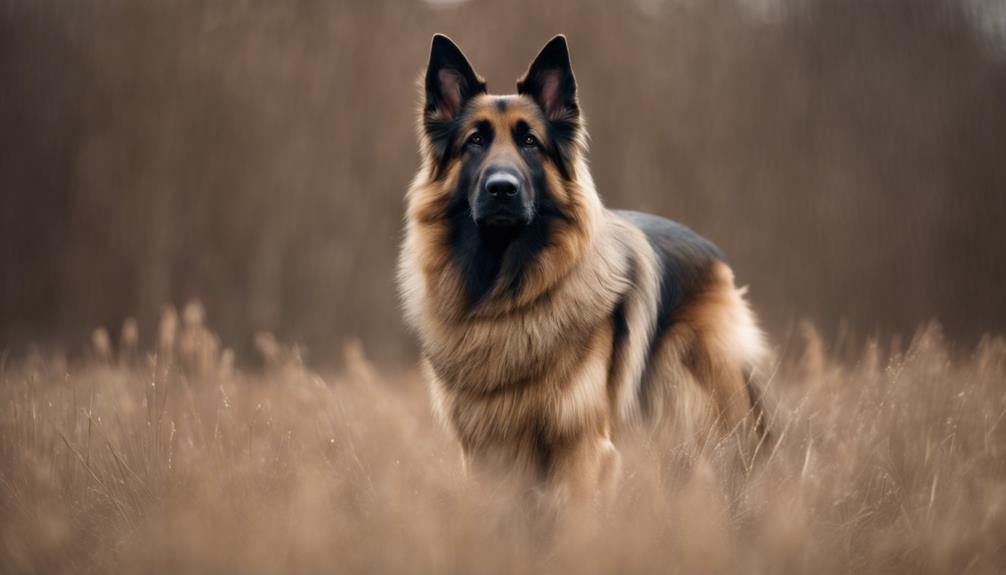
King Shepherds display rare coat patterns due to the intricate interplay of color genetics. These variations can result in striking combinations of sable, brindle, black, white, brown, and silver hues. The length of their coat, whether long, medium, or short, further contributes to the unique appearance of each King Shepherd.
Rare Coat Patterns
Featuring a diverse range of rare coat patterns, the King Shepherd breed showcases unique coat color variations that distinguish them from conventional German Shepherds. King Shepherds can exhibit rare coat patterns such as sable, brindle, and silver colors, adding to their individuality. These patterns can range from solid colors to striking combinations, enhancing the overall beauty of the breed. The rare coat patterns in King Shepherds contribute to their uniqueness and appeal, setting them apart from other breeds. Each King Shepherd's coat tells a story of genetic diversity and can be a key element in identifying and appreciating the breed's distinct characteristics.
Color Genetics Explained
Color genetics in King Shepherds manifest through a diverse range of unique coat color variations, influenced by multiple genes and resulting in a striking array of hues. King Shepherds can exhibit coat colors such as sable, brindle, black, white, and brown, showcasing the breed's genetic complexity. These unique coat color variations contribute to the visual distinctiveness of each King Shepherd, making them stand out. Breeders play a crucial role in selecting for desired coat colors to maintain breed standards and preserve the striking appearance of King Shepherds. By understanding the intricacies of color genetics in this breed, breeders can predict potential coat color outcomes in their breeding programs, ensuring the continuation of these desired coat colors.
King Shepherd's Adaptability
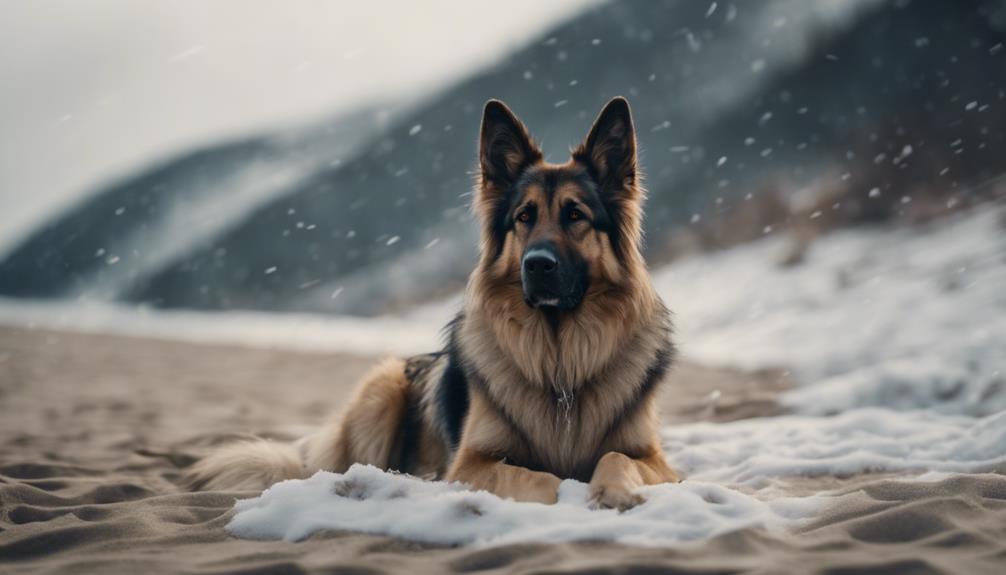
Adapting easily to apartment living, the King Shepherd breed thrives with proper exercise and mental stimulation. Their quiet and low-energy nature makes them well-suited for indoor environments, provided their needs are met. Here are five key points to consider regarding the King Shepherd's adaptability:
- Exercise Needs: While living in an apartment, King Shepherds can maintain their exercise requirements through indoor playtime or brisk walks. It's essential to ensure they get enough physical activity to keep them healthy and happy.
- Mental Stimulation: Keeping these intelligent dogs mentally stimulated is vital for their well-being. Interactive toys, training sessions, and puzzle games can help fulfill their mental needs even within the confines of an apartment.
- Consideration for Neighbors: King Shepherds are considerate of their surroundings and tend to be quiet, making them suitable for apartment living. Their calm demeanor and low-energy levels contribute to a peaceful coexistence with neighbors.
- Adaptability: Despite their larger size, King Shepherds can adapt well to smaller living spaces when provided with the necessary care and attention. Their adaptable nature allows them to thrive in various environments.
- Comparison with Small Breeds: While King Shepherds are well-suited for apartments, it's worth noting that certain small dog breeds can also flourish in such settings with the right care and focus on their specific needs.
King Shepherd's Trainability
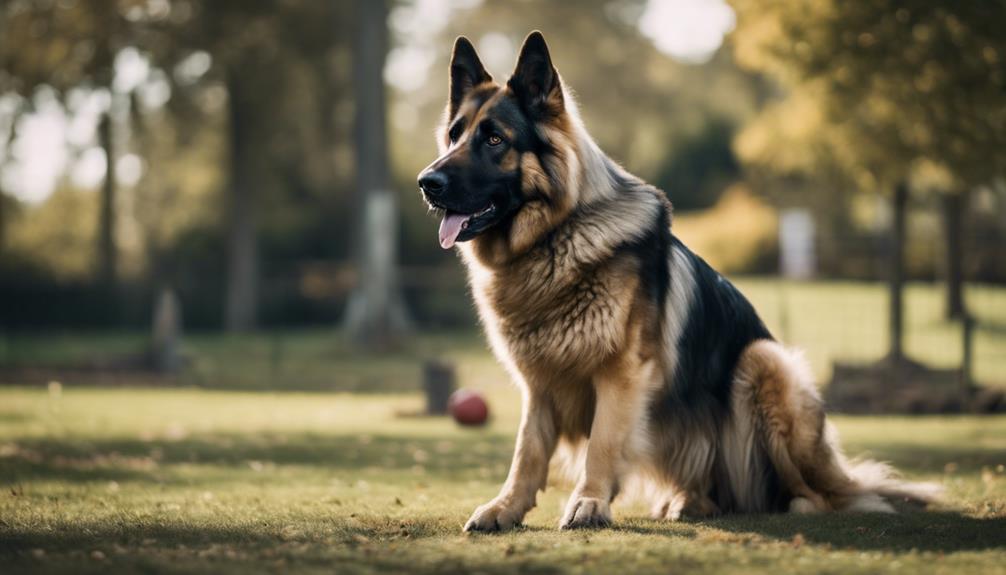
King Shepherds demonstrate exceptional trainability stemming from their high intelligence and eagerness to please. This combination of traits makes them highly trainable and versatile for various roles such as therapy work, personal protection, and livestock guarding. Their intelligent nature allows them to grasp commands quickly, while their eagerness to please motivates them to excel in training sessions. Utilizing positive reinforcement techniques is particularly effective with King Shepherds, as they respond well to praise and rewards, ensuring a positive learning experience.
| Trainability Factors | Description |
|---|---|
| Intelligence | King Shepherds are known for their high level of intelligence, enabling them to understand complex commands and tasks. |
| Eagerness to Please | Their strong desire to please their owners makes them attentive and motivated during training sessions. |
| Positive Reinforcement | Reward-based training methods work effectively with King Shepherds, as they thrive on positive feedback and incentives. |
| Versatility | Due to their trainability, King Shepherds can be trained for various roles such as therapy work, personal protection, and livestock guarding. |
Consistent training is key to harnessing the full potential of King Shepherds. Starting training early helps establish good behavior habits and ensures that they grow into well-rounded companions. By channeling their energy and intelligence through training, King Shepherds can become not just obedient pets but also reliable partners in various tasks.
Health and Grooming Needs
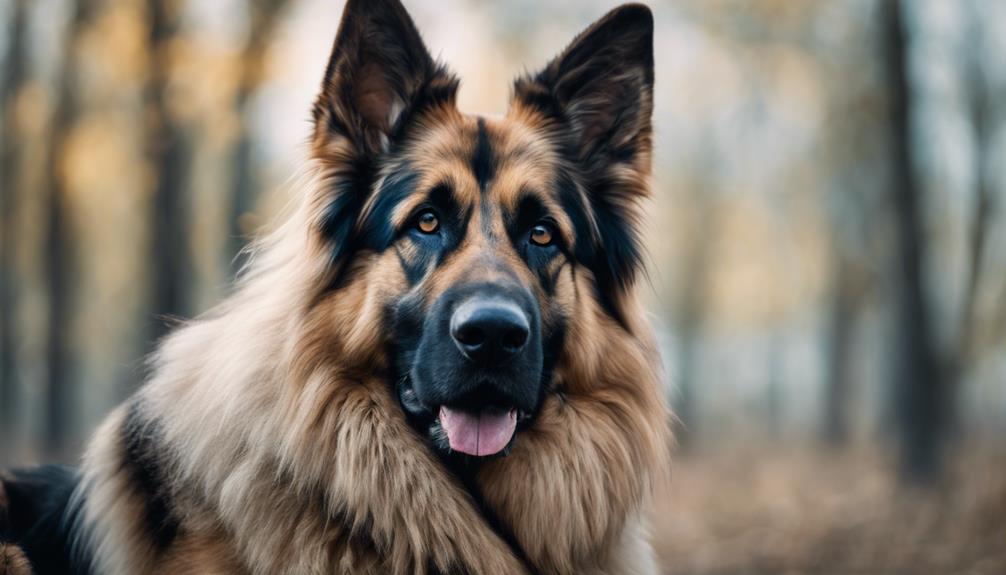
To ensure the overall well-being of your King Shepherd, understanding their specific health and grooming needs is essential. King Shepherds are generally healthy dogs with no known breed-specific health issues. Their coat is highly weather-resistant, necessitating regular brushing to upkeep its quality. These dogs are not suited for apartment living, thriving instead in homes with ample space for exercise. Daily brisk walks, jogs, or runs are beneficial for meeting their exercise requirements. Grooming practices for King Shepherds involve routine brushing and baths as needed to maintain a healthy and clean coat.
- Health Issues: King Shepherds are generally healthy dogs and do not have any specific health issues associated with their breed.
- Grooming: Their highly weather-resistant coat requires regular brushing to keep it in good condition.
- Exercise Needs: King Shepherds are not suitable for apartment living and need homes with large yards for ample activity.
- Coat Maintenance: Daily brisk walks, jogs, or runs are essential to meet their exercise requirements.
- Weather-Resistant Coat: Regular brushing and baths when necessary help to keep their coat healthy and clean.
King Shepherd's All-around Friendliness
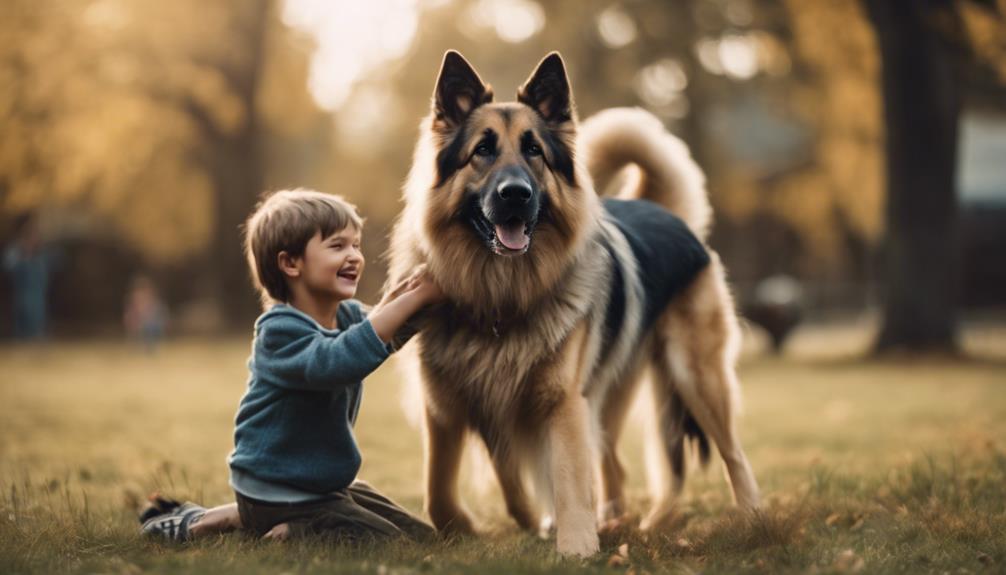
Known for their sociable nature and adaptability, King Shepherds exhibit a remarkable all-around friendliness towards both unfamiliar individuals and children alike. This breed's friendly demeanor is rooted in its loyalty and affectionate temperament, making them excellent companions for families and individuals seeking a devoted pet. Their protective instincts add a layer of security, as they are quick to alert their owners to any potential threats, showcasing their trainable nature for guarding tasks.
King Shepherds' versatility extends beyond being loyal and friendly companions. With the right training and socialization, they can excel in various roles, including therapy dogs. Their stable temperaments and affectionate demeanor make them well-suited for providing comfort and emotional support to those in need. Additionally, their calm presence around children highlights their adaptability to different environments, further solidifying their reputation as an all-around friendly breed.
Compatibility With Families and Kids
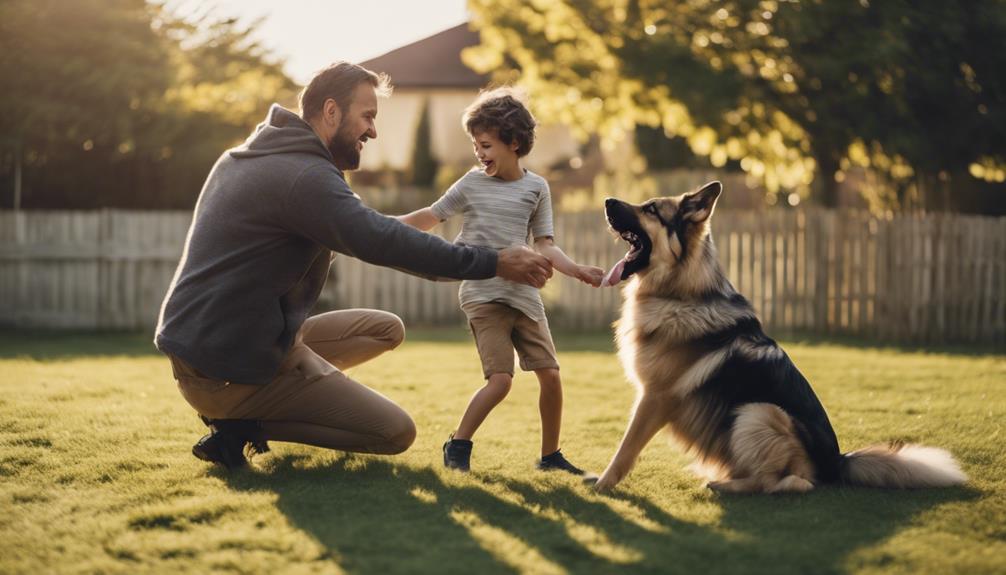
King Shepherds exhibit a family-friendly temperament that is both playful and gentle, making them well-suited for households with children. Their calm and affectionate nature allows for safe interactions with kids, fostering a secure environment within the family unit. Proper socialization ensures that King Shepherds form strong bonds with children and contribute positively to family dynamics.
Family-friendly Temperament
With their family-friendly temperament, King Shepherds demonstrate an affectionate and calm demeanor that makes them ideal companions for households with children. These dogs are not only protective but also gentle, striking a balance that ensures safety and warmth for your family. Their loyalty and trainability further solidify their position as excellent family pets, always eager to please and ready to learn. Through proper socialization, King Shepherds easily integrate into the family dynamic, forming strong bonds with both children and other pets. Their stable temperament guarantees safe and positive interactions, especially with younger family members, making them a trusted and reliable presence in your home.
- Protective yet gentle nature
- Loyalty and trainability
- Excellent socialization skills
- Strong bonds with children and other pets
- Safe and positive interactions
Playful and Gentle
Playful and gentle in their demeanor, King Shepherds exhibit a compatibility with families and kids that highlights their affectionate nature and suitability as companions for households with children. Their family-friendly temperament is underscored by their loyalty and protective instincts, making them reliable guardians. King Shepherds' patient and calm demeanor allows them to interact well with children of all ages, emphasizing their gentle nature. These dogs, when properly socialized, are known to be tolerant and amiable playmates for kids. Their affectionate and friendly disposition towards family members, especially children, contributes to their reputation as a family-friendly breed. When seeking a companion that is both playful and gentle, the King Shepherd stands out as a loving and loyal addition to any family dynamic.
Exercise Requirements for King Shepherds
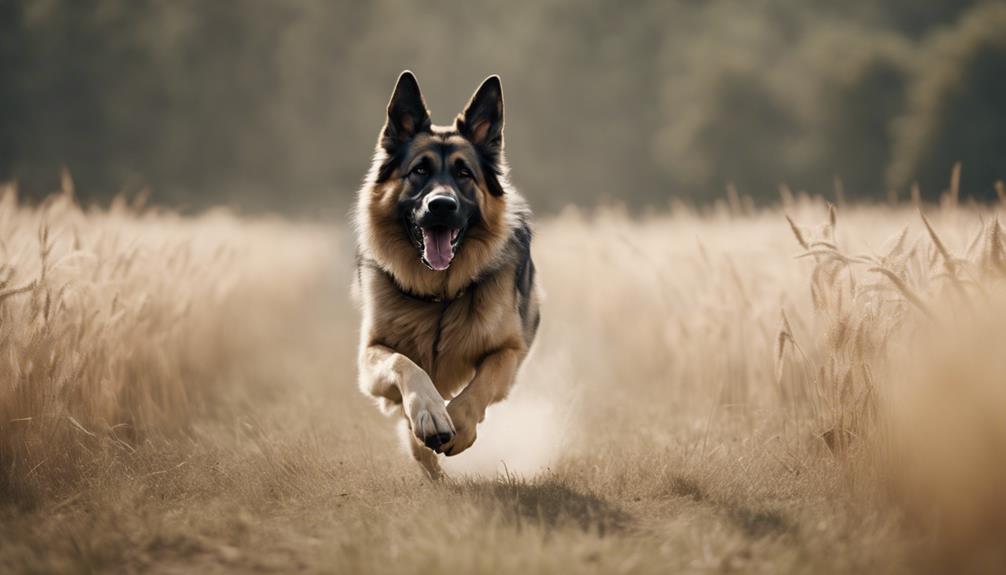
To maintain the physical and mental well-being of King Shepherds, consistent daily exercise of at least 1-1.5 hours of walking or jogging is essential. King Shepherds are sturdy and athletic dogs that require regular physical engagement to stay healthy and happy. Here are key points to consider for exercising your King Shepherd effectively:
- Physical Exercise: King Shepherds are not hyperactive but need sufficient physical activity to prevent health issues and maintain their overall well-being.
- Mental Stimulation: In addition to physical exercise, mental stimulation is crucial for King Shepherds to prevent boredom-related behaviors and keep their minds sharp.
- Agility Training: These intelligent dogs excel in activities like agility training, which provide both physical and mental engagement, promoting their overall health and fitness.
- Consistent Routines: Providing consistent exercise routines is vital for King Shepherds. It helps establish a sense of structure and contributes to their happiness and behavior.
- Health Benefits: Regular exercise not only keeps King Shepherds physically fit but also improves their mental health, leading to a well-balanced and contented pet.
Frequently Asked Questions
What Are the Characteristics of a King Shepherd?
You will find King Shepherds to be calm, adaptable, and intelligent. Their size ranges from 25-31 inches and 75-150 pounds. Expect a long, straight, or wavy coat in various colors. They need regular exercise, training, and grooming.
What Makes German Shepherds Unique?
You are fascinated by German Shepherds, renowned for being intelligent companions, versatile working dogs, loyal protectors, obedient family pets, exhibiting athletic agility, strong herding instincts, and boasting a stunning appearance. Their multifaceted nature captivates admirers worldwide.
Why Were King Shepherds Bred?
King Shepherds were bred for specific purposes like personal protection, therapy work, and livestock guarding. They exhibit loyal and protective temperaments, require proper socialization, and have distinctive features like a square skull, almond-shaped eyes, and a weather-resistant coat.
How Do I Know if My Dog Is a King Shepherd?
To identify a King Shepherd, observe their large size, rectangular shape, erect ears, and almond-shaped dark brown eyes. Note their calm, adaptable temperament, thick coat in various colors, and well-muscled build. Consider their intelligent behavior, need for training, and potential health concerns.
Conclusion
In conclusion, the King Shepherd breed stands out for its impressive size, loyal nature, and adaptability to various tasks. Like a mighty oak tree standing tall and strong, these majestic canines possess a unique combination of traits that make them exceptional companions. With their friendly yet reserved demeanor, striking coat colors, and versatility in roles such as personal protection and therapy work, King Shepherds truly embody the epitome of a well-rounded and dependable breed in the canine world.
